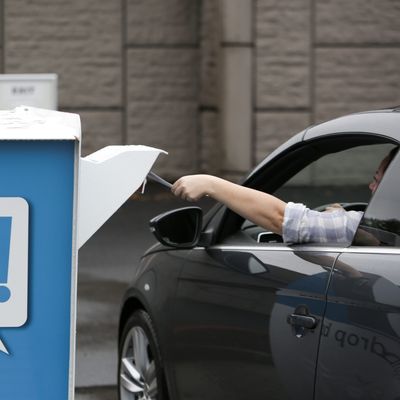
As the United States drifts toward what appears likely to become a shift between efforts to contain COVID-19 and a new policy of voluntary or even mandatory social distancing, the state with (so far) the most extensive outbreak of the coronavirus, Washington, is holding a presidential primary election tomorrow. Normally, you’d think an election might be the second-most-worrisome form of balloting in terms of relying on large public gatherings, sometimes with long waiting lines in poorly ventilated indoor spaces. The most worrisome would be a caucus — the very definition of a mass meeting — which Washington held in 2016.
Luckily for hopes of high participation and low anxiety, Washington is one of the 11 states in which Democrats (with the active encouragement of the Democratic National Committee) shifted from caucuses to primaries between 2016 and 2020. Even better yet, in actual elections, Washington (like Oregon and Colorado) is an all-mail-ballot state in which voting is done exclusively from the (presumably self-isolated) home. Fast Company explains how, exactly, it works:
Voters begin receiving ballots starting 18 days before Election Day. They’ll fill them out and leave them at a post office or a drop box (each of which is emptied daily by crews). The ballots are delivered to the county auditors’ offices, where they’re counted and checked for security measures (such as that the signature on the back of the envelope matches the one on file). They’re then ready for tabulation, which starts at 8 p.m. on election night.
But even this highly individualized process isn’t immune from fears and disruptions associated with the coronavirus crisis:
Ballot handlers across all 39 counties have been instructed to wash their hands thoroughly, and to wear gloves while processing the voting cards, [Washington Secretary of State Kim Wyman] tells Fast Company, in case microbes are still active on envelopes—particularly in the seals.
To minimize those transmittable droplets, Wyman’s office has asked that voters refrain from licking envelopes shut, and rather seal them with a wet sponge or cloth.
Most recently, the state has been encouraging voters to use drop boxes rather than the postal service to deliver their votes in case postal delivery is disrupted by coronavirus concerns.
All in all, Washington has taken about all the reasonable steps available to remain a functioning democracy in this crisis. Since ballots postmarked by primary day will be accepted, it could be a while before turnout can be measured. COVID-19 has definitely curtailed traditional campaign events and canvassing:
Carin Chase, Senator Sanders’s state director for Washington, tells Fast Company the campaign is in the middle of planning a series of “virtual barnstorms,” information sessions for the public that will be held digitally, rather than in person, as usual. One physical barnstorm was canceled due to low turnout, Chase guesses because of virus worries.
But these well-anticipated issues pale in comparison with what could happen in the rest of this election year if the virus continues to spread, particularly in the majority of jurisdictions that depend on in-person voting. The New York Times notes it could become a huge civic problem:
A presidential election unfolds over months in crowded campaign rallies and nominating conventions, and culminates in November when more than 130 million voters and nearly a million poll workers come together in firehouses and gymnasiums, swiping fingers on touch screens or opening up those aforementioned licked envelopes. The effects of a socially transmitted respiratory virus, if it were to spread unabated through campaign season, would be almost endless.
There’s no guarantee, of course, that virus-related disruptions of campaigns and elections will affect different parts of the country to the same extent or at the same pace. So, the issue has become and will probably remain a huge variable hanging over the outcome of this year’s high-stakes partisan contests, much as COVID-19 hangs over the entire public-health system. And that’s something to worry about, even if you’re not being subjected to quarantine or social distancing.






























